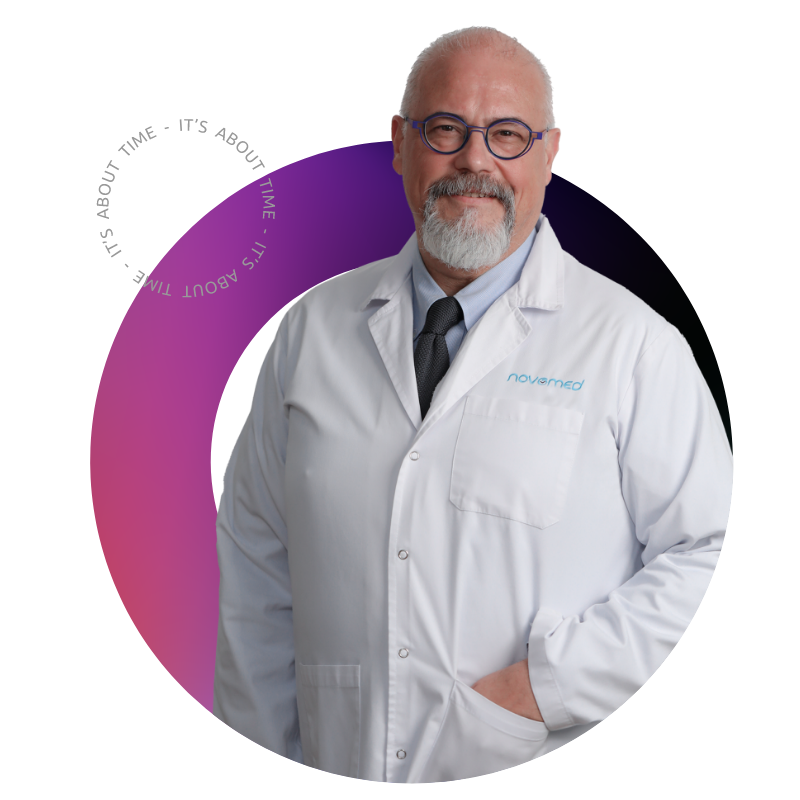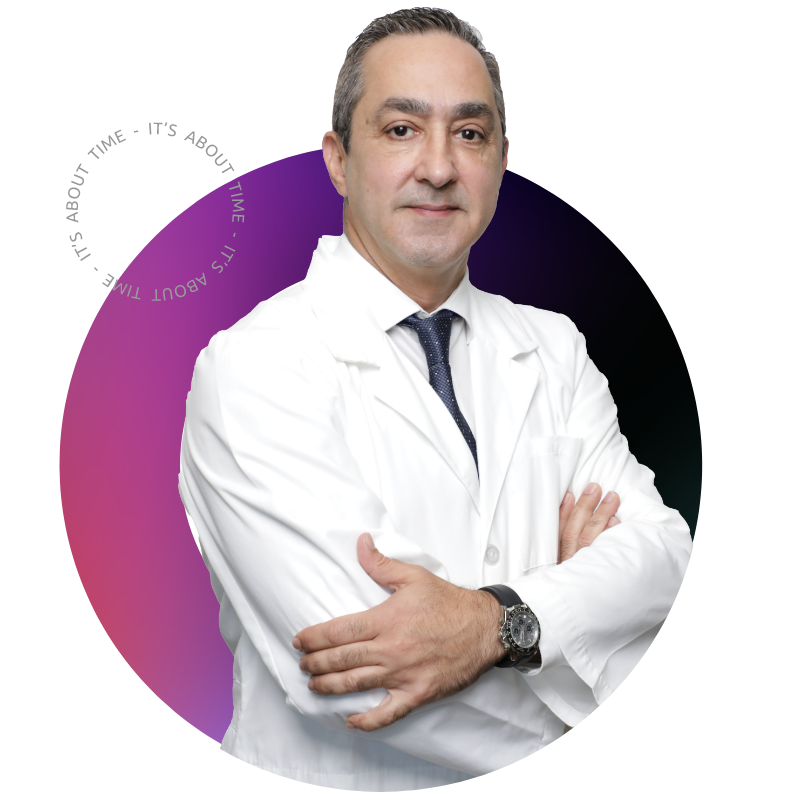Welcome to The Novomed Urology Clinic in Abu Dhabi, where your well-being and comfort are our top priorities. If you or your loved ones are grappling with kidney stones, rest assured that you are in the care of leading experts in the field. Our renowned urologists, armed with years of experience, compassion, and state-of-the-art technology are committed to innovate procedures and offer the best possible outcomes, allowing you to resume your daily life with renewed health and vitality. With a focus on personalized care, we tailor our treatment plans to address your unique needs, ensuring the most effective and efficient solutions for your condition.
What are Kidney Stones?
Kidney stones, medically known as renal calculi or nephrolithiasis, are solid mineral and salt deposits that form within the kidneys. They can vary in size, ranging from tiny grains to larger stones causing severe pain and discomfort as they move through the urinary tract.
Types of Kidney Stones:
Kidney stones can be classified into different types based on their composition. The four main types of kidney stones are:
- Calcium Stones: These are the most common type of kidney stones, accounting for approximately 80% of cases. Calcium stones are primarily composed of calcium oxalate or calcium phosphate. High levels of calcium and oxalate in the urine can lead to the formation of these stones. Certain dietary factors and medical conditions may contribute to their development.
- Struvite Stones: Also known as infection stones, struvite stones are formed in response to urinary tract infections. These stones can grow rapidly and become quite large. They are composed of magnesium, ammonium, and phosphate. One concerning aspect of struvite stones is their tendency to recur. Unless the underlying urinary tract infection is effectively treated and eradicated, the stones may come back even after removal.
- Uric Acid Stones: Uric acid stones form when there are high levels of uric acid in the urine. They can be associated with conditions such as gout or certain metabolic disorders. Uric acid stones are more common in individuals who consume a high-purine diet.
- Cystine Stones: Cystine stones are rare and occur in individuals with a genetic disorder called cystinuria. This condition causes the kidneys to excrete too much cystine, an amino acid, into the urine, leading to the formation of crystals and stones.
It is important to note that some kidney stones may have a combination of components, making their composition more complex. The type of kidney stone a person develops can influence the recommended treatment and preventive measures.
Kidney Stones Symptoms:
The symptoms of kidney stones can vary depending on their size and location within the urinary tract. The most common symptoms are:
- Pink, red or brown urine.
- Severe pain in the back, abdomen and groin.
- Painful urination.
- Hematuria (blood in urine)
- Nausea and vomiting.
- Frequent urge to urinate.
- Cloudy or foul-smelling urine.
- Fever and chills in case of infection.
- Urinating in small amounts.
Kidney Stones Causes:
Kidney stone formations can arise from a multitude of factors, and understanding these causes is crucial in preventing their occurrence and ensuring effective treatment. The primary causes of kidney stone formation are elucidated below:
- Diet and Dehydration: Dietary habits play a pivotal role in kidney stone development. Consuming an excessive amount of foods rich in oxalates, such as spinach, nuts, and chocolate, can contribute to the formation of calcium oxalate stones. Additionally, inadequate fluid intake can lead to concentrated urine, making it easier for crystals to clump together and form stones.
- Metabolic Disorders: Certain medical conditions can disrupt the body’s metabolic balance, leading to kidney stone formation. Conditions like hyperparathyroidism, cystinuria, and renal tubular acidosis can increase the levels of specific substances in the urine, increasing the risk of stone development.
- Family History: A family history of kidney stones can indicate a genetic predisposition to stone formation. If a close relative has experienced kidney stones, it is essential to be vigilant and adopt preventive measures.
- Urinary Tract Infections: Struvite stones, also known as infection stones, can develop in response to persistent urinary tract infections. Bacteria that produce urease contribute to the alkaline environment, fostering the growth of struvite crystals.
- Obesity and Weight Gain: Individuals who are overweight or obese are more susceptible to kidney stone formation. Obesity can alter urinary composition and increase the risk of stone development.
- Certain Medications: Some medications, such as diuretics, antacids containing calcium, and certain anti-seizure drugs, can promote the formation of kidney stones.
- Urinary Tract Abnormalities: Structural abnormalities in the urinary tract, such as kidney cysts or narrow ureters, can obstruct urine flow and create an environment conducive to stone formation.
Understanding the underlying causes of kidney stone formation empowers individuals to adopt preventive measures. A balanced diet, adequate hydration, regular physical activity, and seeking medical advice for relevant conditions are essential steps in reducing the risk of kidney stone recurrence and promoting overall kidney health.
What is a Renal Colic?
Renal colic, a distressing condition, manifests as intense pain caused by the passage of kidney stones through the urinary tract. This excruciating pain typically originates in the back, below the ribs, and radiates to the lower abdomen and groin. Renal colic can be paroxysmal, triggering waves of agony that incapacitate the individual. As the stone moves through the narrow ureters, it causes irritation and inflammation, leading to the sharp, intermittent pain characteristic of renal colic. Immediate medical attention is imperative to manage this excruciating ordeal effectively.
Kidney Stones Diagnosis:
At Novomed, our dedicated team of urologists employs a comprehensive approach to accurately diagnose kidney stones, ensuring personalized and effective treatment plans for each patient. Our cutting-edge diagnostic methods include:
- Thorough Medical History and Physical Examination: The urologist will inquire about the patient’s symptoms, medical history, and any previous occurrences of kidney stones.
- Advanced Imaging Techniques for Precise Visualization: To gain a clear and detailed picture of kidney stones, we rely on state-of-the-art imaging technologies such as CT scans, X-rays, and ultrasounds. These sophisticated techniques allow our experts to visualize the presence, size, and exact location of the kidney stones, facilitating
swift and accurate decision-making regarding the most suitable treatment approach. - Comprehensive Urine Analysis: At Novomed, we recognize the importance of a thorough urine analysis in diagnosing kidney stones. By carefully examining a urine sample, we can identify the presence of blood, minerals, and other substances that might indicate the existence of kidney stones. This meticulous analysis plays a pivotal role in confirming the diagnosis and guiding us towards the best course of action.
Kidney Stones Treatment:
Novomed Urology Clinic offers a range of effective treatments for kidney stones, tailored to
the individual needs of each patient:
- Observation: Small, asymptomatic kidney stones may not require immediate treatment. The urologist may recommend periodic monitoring to observe any changes in size or symptoms.
- Medications: Certain medications can aid in the passage of small kidney stones or help dissolve certain types of stones.
- Extracorporeal Shock Wave Lithotripsy (ESWL): This non-invasive procedure uses shock waves to break larger kidney stones into smaller fragments, making it easier for the body to pass them naturally.
- Ureteroscopy: For stones that are lodged in the urinary tract, a ureteroscope is used to locate and remove them, or they can be broken down with laser energy.
- Percutaneous Nephrolithotomy (PCNL): A minimally invasive procedure where a small incision is made in the back to access and remove larger kidney stones.
Book Your Appointment at Novomed Today!
If you’re experiencing symptoms of kidney stones or require expert consultation and treatment, the Urology Clinic at Novomed, Abu Dhabi, is your go-to destination. Our skilled urologists and advanced treatment options ensure that patients receive comprehensive care and relief from kidney stone-related issues. Book your consultation today by calling 8006686 or filling the booking form below and take the first step towards a healthier and stone-free life with Novomed.




























